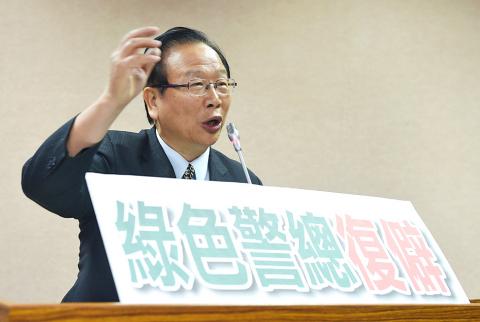A bill aimed at promoting transitional justice proposed by the Democratic Progressive Party (DPP) caucus was yesterday discussed by the legislature’s Judiciary and Organic Laws and Statutes Committee, with Chinese Nationalist Party (KMT) lawmakers questioning the need for draft legislation and the ad hoc committee it proposes.
The draft legislation outlines four main missions to be carried out by the government under the leadership of a “transitional justice promoting committee” to be established under the Executive Yuan: opening up political archives, eliminating authoritarian symbols and conserving negative heritage (不義遺址), redressing the judiciary’s unlawfulness and restoring historical truth, and dealing with ill-gotten KMT party assets.
KMT lawmakers gathered in the front of the meeting room and shouted that the legislation is the DPP’s “green dictatorship” and part of a political feud with the KMT.

Photo: Chien Jung-fong, Taipei Times
“Wasn’t Taiwan a democracy during the time when Chen Shui-bian (陳水扁) was president? Why is the DPP calling for transitional justice only now?” KMT Legislator Lai Shyh-bao (賴士葆) asked.
Lai blasted a clause in the draft that permits military police “assistance” if investigation is thwarted or if evidence needs to be protected, calling it a clause that allows the “reappearance of the Taiwan Garrison Command,” and accused the DPP and the bill it proposed of being “fascist” and of overstepping the authority of the judiciary.
KMT legislators Lin Te-fu (林德福) and Lin Wei-chou (林為洲) said that the bill is “the return of a ‘green Taiwan Garrison Command’” and that the bill would give the government a carte blanche, while the appraisal of the period specified in the draft as authoritarian (1945-1991) is actually “open to interpretation.”
Jason Hsu (許毓仁), TEDxTaipei cofounder-turned KMT legislator-at-large, said he welcomes the idea of transitional justice and cited Germany as a successful example, but he also expressed misgivings about the use of military police.
Executive Yuan Secretary-General Chien Tai-lang (簡太郎) said the setting up of the ad hoc committee proposed by the bill “runs afoul of Article 3 of the Additional Articles of the Constitution of the Republic of China” that has a cap over the number of central, independent committees.
DPP caucus whip Ker Chien-ming (柯建銘) said the proposal is simply a “framework legislation,” which is to provide directions for future efforts on realizing transitional justice on various fronts and emphasized that the specifics of the clauses could be further discussed.
“The need for military police, in the capacity of judicial police, is because there are documents that are in the hands of military units,” he added.
DPP Legislator Yu Mei-nu (尤美女) said: “Only when the historical truth is disinterred and restored could there be forgiveness and reconciliation,” and that the fact that the KMT reacts so strongly to the bill is the reason the nation needs transitional justice.
She asked lawmakers to “be circumspect when making comments” and to stop “misleading the public by calling the bill the DPP’s political machination.”
DPP Legislator Tuan Yi-kang (段宜康), who was the presiding chair of the meeting yesterday, said that he deemed some of the comments made “completely shameless.”
“Society calls for death to a murderer who kills one person, but when a person is responsible for tens of thousands of lives, we build the largest temple in the nation to commemorate him,” Tuan said, referring to the Chiang Kai-shek Memorial Hall.
The committee resolved to hold at least four public hearings before undertaking a clause-by-clause review of the bill, which was not done yesterday.

A strong continental cold air mass is to bring pollutants to Taiwan from tomorrow, the Ministry of Environment said today, as it issued an “orange” air quality alert for most of the country. All of Taiwan except for Hualien and Taitung counties is to be under an “orange” air quality alert tomorrow, indicating air quality that is unhealthy for sensitive groups. In China, areas from Shandong to Shanghai have been enveloped in haze since Saturday, the ministry said in a news release. Yesterday, hourly concentrations of PM2.5 in these areas ranged from 65 to 160 micrograms per cubic meter (mg/m³), and pollutants were

Taiwan’s armed forces have established response protocols for a wide range of sudden contingencies, including the “Wan Chun Plan” to protect the head of state, the Ministry of Defense (MND) said today. After US President Donald Trump on Saturday launched a series of airstrikes in Venezuela and kidnapped Venezuelan President Nicolas Maduro, concerns have been raised as to whether China would launch a similar “decapitation strike” on Taiwan. The armed forces regularly coordinate with relevant agencies and practice drills to ensure preparedness for a wide range of scenarios, Vice Minister of National Defense Hsu Szu-chien (徐斯儉) told reporters before a

EVA Airways on Saturday said that it had suspended a pilot and opened an investigation after he allegedly lost his temper and punched the first officer several times as their plane was taxiing before takeoff at Los Angeles International Airport. According to a report published on Thursday by The Reporter, the incident occurred after the flight’s Malaysian first officer tried to warn the Taiwanese pilot, surnamed Wen (文), that he was taxiing faster than the speed limit of 30 knots (55.6kph). After alerting the pilot several times without response, the first officer manually applied the brakes in accordance with standard operating

Japanese Councilor Hei Seki (石平) on Wednesday said that he plans to visit Taiwan, saying that would “prove that Taiwan is an independent country and does not belong to China.” Seki, a member of the Japan Innovation Party, was born in Chengdu in China’s Sichuan Province and became a naturalized Japanese in 2007. He was elected to the House of Concilors last year. His views on the Chinese Communist Party (CCP) — espoused in a series of books on politics and history — prompted Beijing to sanction him, including barring Seki from traveling to China. Seki wrote on X that he intends